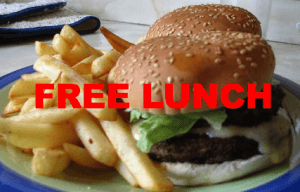For the Environment, There’s No Such Thing as a Free Lunch

One measure of this is called EROI, or energy return on investment, meaning the ratio of the energy we put into a certain thing to that which we get back. Wind energy, to take an example, carries with it an EROI of somewhere between 15 and 30. So, optimistically, for every 30 KWhrs of energy produced by a wind turbine, 1 KWhr went into sourcing and processing the raw materials, delivering and installing the device, and then maintaining it through its lifecycle.
“There is no such thing as a free lunch” is an aphorism that grew out of the practice of saloons’ of the late 19th and early 20th Centuries offering a “free lunch” to attract customers who would, in the course of consuming that lunch, normally buy a beer or two. The implication here is that everything comes with a cost, which it certainly true of things like energy generation and consumption.
Not to digress, but this appears to be true, strictly speaking about the physical world around us. It’s clearly not true if we include other dynamics of our lives. There is no cost–and in fact, there is a net gain–to a smile, to providing a helping hand to someone who needs one, to teaching a child to swim, or to falling in love.)
In any case, those of you who subscribe to the Writer’s Almanac may see where I’m going with this. The poem for today (August 6, 2017), written by one of my personal favorites, Tony Hoagland, is called “Candlelight” and it goes like this:
Crossing the porch in the hazy dusk
to worship the moon rising
like a yellow filling-station sign
on the black horizon,
you feel the faint grit
of ants beneath your shoes,
but keep on walking
because in this world
you have to decide what
you’re willing to kill.
Saving your marriage might mean
dinner for two
by candlelight on steak
raised on pasture
chopped out of rain forest
whose absence might mean
an atmospheric thinness
fifty years from now
above the vulnerable head
of your bald grandson on vacation
as the cells of his scalp
sautéed by solar radiation
break down like suspects
under questioning.
Still you slice
the sirloin into pieces
and feed each other
on silver forks
under the approving gaze
of a waiter
whose purchased attention
and French name
are a kind of candlelight themselves,
while in the background
the fingertips of the pianist
float over the tusks
of the slaughtered elephant
without a care,
as if the elephant
had granted its permission.
“Candlelight” by Tony Hoagland from Donkey Gospel. © Graywolf Press, 1998.

Craig,
Hmmm,… I’m afraid unlike yourself and Tony Hoagland, I’ve never been able to enjoy reveling in self-imposed guilt or the hypocrisy of self flagellation.
I thank you for including a fascinating insight which may explain much of your attitudes to the environment and political philosophy.
Guilt is a powerful emotion, and is usually underpinned by insecurity. Perhaps the source of your guilt and insecurity can be traced to an early Calvanist or similar religious instruction, or Puritanical education.
Too much focus and reflection on the imperfection of man and his inherent propensity for wickedness and ‘greed’ gave rise to the philosophies of socialism etc.
While it’s true there’s not such thing as a “free’ lunch, grim reflection and obsessive moralizing on wickedness of enjoyment is a form of self indulgence ! (and therein lies the paradox !)